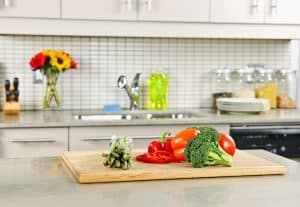
Used for thousands of years, soapstone has long been one of the most popular materials for everything from bowls to hand tools. Soapstone is an entrancing, common stone with metamorphic properties. Historically, it has been used for building because it is soft enough to cut without machine tools while still being durable.
Here’s everything you need to know about soapstone counters.
The Advantages of Soapstone Counters
Soapstone is a natural, quarried material that comes in virtually any shade. You can find soapstone in reds, blues, and blacks. It has become very trendy as a material in part because it can be used in so many designs and so many contexts. Soapstone can be used for anything a hard, quarried stone can be used for, from countertops to natural stone tile. Soapstone is also a more affordable stone than, say, marble, making it excellent for large counter installations or modern installations such as “waterfall” counters.
Importantly, soapstone is extremely low maintenance and durable. It is heat resistant, so you can put hot pots and pans directly on it (though you still shouldn’t do this with glass dishes, but it’s the glass that might fracture). It’s acid resistant. And it’s also nonporous, so you don’t need to seal it. Other natural stones like granite and marble need to be regularly sealed, or they can become stained. That’s not to say that soapstone is right for every kitchen, but it has a lot going for it.
Like other types of natural stone, soapstone will improve your property values and is generally seen to be trendy and appealing. So if you plan on selling your home in the future, soapstone will be just as much of an upgrade as something like granite or marble. The only thing you need to consider is that people are generally less knowledgeable about soapstone and may need notes on its care.
The Drawbacks of Soapstone Counters
As mentioned, soapstone is a softer material. That can present some problems in a kitchen. It can easily nick and chip. You can resurface it and, in fact, will need to if you want to keep it looking like new. It can wear unevenly and requires oiling to keep it looking nice. So while it doesn’t need to be sealed, you still need to do a little maintenance. Soapstone, because it is soft, doesn’t come in large slabs either, so you are going to need to have seams in the stone (though often they are virtually invisible). And not everyone likes the look of soapstone itself, which doesn’t have the chatoyancy (or “glow”) of stones like marble.
Soapstone is always going to have a bit of an older, worn look, and this fits perfectly in a country kitchen but may be less desirable in something like a modern condo. You will need to experience the aging process or worn patina of the soapstone in person to determine whether it’s going to be a viable long-term option for you. For some, soapstone may be better suited to low-wear applications such as backsplashes rather than counters themselves.
However, if soapstone does become worn and damaged, it can be periodically refinished and polished. It’s just a matter of how much time and effort you want to put into your counters.
Who Should Use Soapstone?
Soapstone can be used in virtually any kitchen, but it lends itself more to rustic applications. Those who have high-volume, very busy kitchens may want to invest in sections of their countertop that can be more readily used, such as built-in butcher blocks. Soapstone isn’t for perfectionists. It takes some work to keep soapstone looking “perfect.” At the same time, it can be exceptionally low maintenance for those who don’t care about a surface that’s a little dinged and damaged.
Soapstone is more expensive than granite but less expensive than marble, which means granite can still be an ideal choice. Though it does need to be sealed, it doesn’t have to be oiled, and it is much harder and resistant to nicks than soapstone. Granite also comes in a tremendous variety of colors and patterns, with each countertop very often being unique. But for most applications, either soapstone, granite, or marble should be fine. It all depends on the aesthetic that you’re looking for.
It’s difficult to understand the appeal of soapstone counters without seeing them for yourself. The warmth and depth of the material can vary depending on the stone, and a showroom is the best place to get a feel for each type of material. Check out Wholesale Granite Direct in Arlington, Richardson, or Granbury today to find out more.

